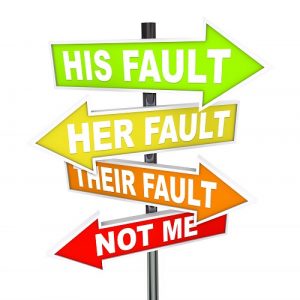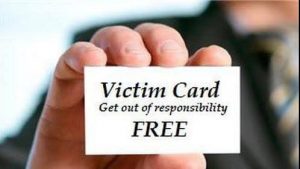What Does It Mean to Take Full Responsibility for Our Lives?
Taking full responsibility for our lives means
taking full responsibility for everything in our lives.
Carry out the logic still further and it leads to a stunning insight, one that’s capable of transforming our lives:
Taking full responsibility for our lives means
taking full responsibility for everything in our lives,
regardless of what has happened or why.
That means taking full responsibility for our thoughts, feelings, words, actions, circumstances, and impacts. It means taking full responsibility for our health, relationships, education, career, finances, choices, behaviors, and free time.
Our ability to accept responsibility for things depends on our sense of agency: our perceived ability to influence events and direct them toward the achievement of our goals.
Locus of Control
That brings us to what psychologists call “locus of control”: the extent to which we feel that we have control over the events of our lives. Are we the captains of our fate, steering the ship toward our horizon of choice, or are we drifters on a raft, being carrier by the current and winds randomly out to sea?
Researchers distinguish between an internal locus of control (when we believe that control over what happens resides within us) and an external locus of control (when we attribute success to luck, fate, or other outside influences). Note that locus of control occurs on a continuum; it’s not a one-or-the-other situation.
According to researchers, people with an internal locus of control tend to:
- be healthier
- report being happier
- exhibit more independence
- achieve greater success in the workplace
So far, we’ve seen that it means to take full responsibility for our lives. It sounds simple enough. But it’s quite difficult to do it consistently—and it’s exceedingly rare.
How to Know If You’re Not Taking Full Responsibility?
Most people bounce back and forth between taking responsibility for their lives and shirking that responsibility. How to know if we’re not taking responsibility?
When we’re avoiding responsibility, we’re tending toward the following:
- blaming others
- complaining about things
- feeling hopeless
- experiencing “learned helplessness” (when we stop trying to change things because we’ve become conditioned to believe that a bad situation is inescapable)
- feeling powerless
- drifting through life without traction on our deeper aims
- settling for a less than ideal situation
The Incredible Benefits of Taking Full Responsibility
Taking full responsibility for all aspects of our lives, regardless of what has happened or why, is one of the most important things we can do to improve the quality of our lives, relationships, and work outcomes. It comes with many benefits. Taking full responsibility can:
- boost our confidence
- provide us with a more resilient sense of calm which isn’t dependent on others
- increase our decisiveness
- improve our health
- reduce our stress levels
- lead to taking more action in life
- help us achieve our goals
- free us up to see the good in people and situations
- help summon our courage
- lead to better relationships
- help us improve our follow-through
- invoke our power to choose
- dramatically improve our leadership
- help us craft our life intentionally
What We Must Give Up When We Take Full Responsibility
Clearly, the benefits are extensive. But they come at a price. Taking full responsibility means giving up on several bad habits and guilty pleasures. For example:
It means giving up on complaining.

“What you’re supposed to do when you don’t like a thing is change it.
If you can’t change it, change the way you think about it. Don’t complain.”
-Maya Angelou
It means giving up on making excuses.

“He that is good for making excuses is seldom good for anything else.”
-Benjamin Franklin
It means giving up on blaming others.

“An important decision I made was to resist playing the Blame Game. The day I realized that I am in charge of how I will approach problems in my life, that things will turn out better or worse because of me and nobody else, that was the day I knew I would be a happier and healthier person. And that was the day I knew I could truly build a life that matters.”
-Steve Goodier
It means giving up on being a victim.

“Abandon the idea that you will forever be the victim of the things that have happened to you. Choose to be a victor.”
-Seth Adam Smith
What to do instead? Instead of complaining, making excuses, blaming, or playing the victim, change your mindset toward one of agency and accountability. Instead of deflecting toward others (or toward bad luck), turn your gaze within and ask:
What is my role in this?
How have I contributed to this?
What will I do about it now?
Get curious about what happened and why, and what you might do differently in the future to make it better or avoid the same mistake.
What Taking Full Responsibility Doesn’t Mean
Taking full responsibility means holding ourselves totally accountable, but it doesn’t mean being a “Lone Ranger,” disconnected from others.
Even as we take full responsibility for our life, we can—and should—reach out to others for help. We can ask for their input, or for them to help hold us accountable.
For most people, strong social relationships are the most important contributor to enduring happiness. We’re wise to take full responsibility for our relationships too, instead of expecting others to know what we want or waiting for others to change.
Being accountable doesn’t mean being alone. It means being the captain of our lives, being a “life entrepreneur.”
And it ultimately means changing the trajectory of our lives toward more fulfillment and better outcomes.
“The luckiest people are those who learn early… that it’s essential to take charge of your own life. That doesn’t mean you don’t accept help, friendship, love, and leadership—if it’s good leadership—from others. But it does mean recognizing that ultimately you’re the one who’s responsible for you.”
-John W. Gardner
Reflection Questions on Taking Responsibility for Your Life
- In what areas are you:
- complaining?
- making excuses?
- blaming others?
- being a victim?
- What will you do, starting today, to take back the initiative and take full responsibility for the situation?
- Are you taking full responsibility for everything in your life, regardless of what has happened or why?














